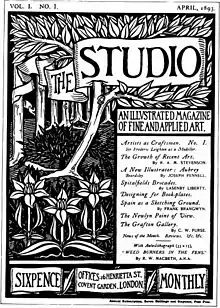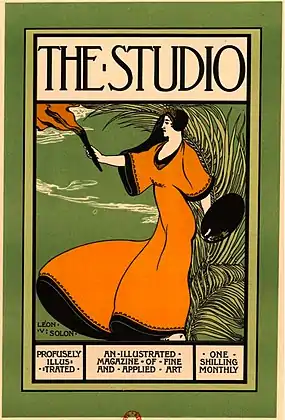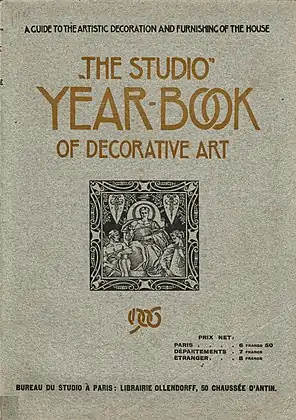 Cover by Aubrey Beardsley for the first issue of The Studio | |
| Editor |
|
|---|---|
| Categories | fine arts, decorative arts |
| Frequency | monthly |
| Publisher |
|
| Founder | Charles Holme |
| Founded | 1893 |
| First issue | April 1893 |
| Final issue Number | May 1964 853 |
| Country | United Kingdom |
| Based in | London |
| Language | English |
| ISSN | 0963-5092 |
The Studio: An Illustrated Magazine of Fine and Applied Art was an illustrated fine arts and decorative arts magazine published in London from 1893 until 1964. The founder and first editor was Charles Holme. The magazine exerted a major influence on the development of the Art Nouveau and Arts and Crafts movements.[1]: 15 It was absorbed into Studio International magazine in 1964.
History
The Studio was founded by Charles Holme in 1893.[2]: 145 Holme was in the wool and silk trades, had travelled extensively in Europe and had visited Japan and the United States with Lasenby Liberty and his wife Emma.[2]: 145 During his travels he had formed:[3]: 5 [4]: 6
... the idea of an art magazine crystallised around his recurring observation that the chief barrier between countries was language, and his belief that the more the culture of one part of the world could be brought "visually" to the attention of another, the greater the chance of international understanding and peace.
He retired from trade in order to start The Studio.[2]: 145
He had hoped to engage Lewis Hind as the editor of the new venture, but Hind went instead to William Waldorf Astor's Pall Mall Budget. He suggested Joseph Gleeson White as an alternative.[5] Gleeson White edited The Studio from the first issue in April 1893.[6] In 1895 Holme took over as editor himself, although Gleeson White continued to contribute. Holme retired as editor in 1919 for reasons of health, and was succeeded by his son Charles Geoffrey Holme, who was already the editor of special numbers and year-books of the magazine.[7]
The magazine
The magazine was monthly; 853 issues were published between April 1893 and May 1964.
The Studio promoted the work of "New Art" artists, designers and architects. It played a major part in introducing the work of Charles Rennie Mackintosh and Charles Voysey to a wide audience, and was especially influential in Europe.[8]: 9
In keeping with Holme's original concept, the magazine was international in scope. A French edition was published in Paris, differing from the English one only in that the spine and parts of the cover were printed in French, and there was an insert consisting of a French translation of the article text and some French advertisements.
The American edition was titled The International Studio. It had its own editorial staff, and the content was different from that of the English edition, although many articles from that were reprinted. It was published in New York by John Lane & Company from May 1897 until 1921, and by International Studio, Inc., from 1922 until publication ceased in 1931.
In 1894 and then from 1896 on, special numbers of the magazine were also published, normally three times a year. These carried various titles; 117 of them were issued between 1894 and 1940.[9]
From 1906 onwards The Studio published an annual, The Studio Year-Book of Decorative Art, which dealt with architecture, interior design and design of furniture, lighting, glassware, textiles, metalwork and ceramics. These annuals promoted Modernism in the 1920s, and later the Good Design movement.[8]: 9
The last edition was published in May 1964, after which it was absorbed into Studio International.
 Cover of the Paris edition of The Studio, volume 53 no. 219, June 1911
Cover of the Paris edition of The Studio, volume 53 no. 219, June 1911 Poster by Léon-Victor Solon advertising The Studio
Poster by Léon-Victor Solon advertising The Studio Cover of the first Year-Book, 1906
Cover of the first Year-Book, 1906
References
- ↑ Kevin P. Rodel, Jonathan Binzen (2003). Arts & crafts furniture: from classic to contemporary. Newtown, Connecticut: Taunton Press. ISBN 1561583596.
- 1 2 3 Sonia Ashmore (2002). Lasenby Liberty (1843–1917) and Japan, in: Britain & Japan: biographical portraits. Volume IV. London: Routledge. Accessed June 2013.
- ↑ Bryan Holme (1978). The Studio: A Bibliography. The First Fifty Years 1893–1943. London: Simms and Reed; cited in: Olga Taxidou (1998).
- ↑ Olga Taxidou (1998). The Mask: A Periodical Performance by Edward Gordon Craig. Contemporary Theatre Studies, Volume 30. Amsterdam: Harwood Academic. ISBN 9789057550454.
- ↑ Gerry Beegan (2007). The Studio: Photomechanical Reproduction and the Changing Status of Design. Design Issues. The MIT Press. 23 (4): 46–61. (subscription required).
- ↑ Jerome J. McGann (editor) Scholarly Commentary – Introduction: The Studio. London: Studio Ltd., 1893-1964. The Complete Writings and Pictures of Dante Gabriel Rossetti, online. Accessed June 2013.
- ↑ Julie F. Codell (2004). Holme, Charles (1848–1923). Oxford Dictionary of National Biography, Oxford University Press; online edition, May 2008. doi:10.1093/ref:odnb/33950. Accessed June 2013. (subscription required)
- 1 2 Charlotte J. Fiell, Peter M. Fiell (2000). 1900s 1910s decorative art: a source book. Köln; New York: Taschen. ISBN 9783822860502.
- ↑ Helene E. Roberts (1970). British Art Periodicals of the Eighteenth and Nineteenth Centuries. Victorian Periodicals Newsletter No. 9. The Johns Hopkins University Press on behalf of the Research Society for Victorian Periodicals. 3 (3): 60. (subscription required).
Further reading
- Clive Ashwin (1983). "The Early Studio and Its Illustrations". Studio International 196 (1003): 22–29.
- Clive Ashwin (1976). "The Studio and Modernism: A Periodical's Progress". Studio International 192 (983): 103–112.
- D.J. Gordon (1968). "Dilemmas: The Studio in 1893-4". Studio International 175 (899): 175–183.
- Full text of issues 1–90, covering 1893 to 1925.
External links
![]() Media related to The Studio (magazine) at Wikimedia Commons
Media related to The Studio (magazine) at Wikimedia Commons